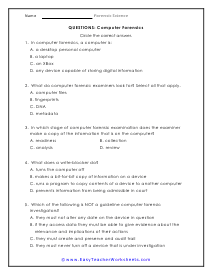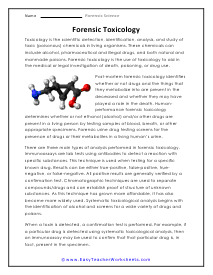Forensic science was a science that originated from necessity. Officer of the law needed help identifying the suspects involved in crimes. Even though television tells us that fingerprints and ballistics are exact sciences and always tell you a story, many experts often don't agree on the same evidence. One of the most often used and reliable forms of data that many of us aren't aware of are bugs. Bugs take a very particular and common path to become active. This often leads investigators to the most reliable timelines available. This has even created its own form of science called forensic entomology. This series of worksheets look at very relevant technologies and the science behind them that focus on solving crimes or understanding basic living better.
Print Forensic Science Worksheets
Click the buttons to print each worksheet and associated answer key.

What is Forensic Science?
The Greek Archimedes (287 to 212 B.C.E.) was one of the earliest users of forensic science. He used the principles of water displacement to prove (by its density and buoyancy) that a crown claimed to be made of gold was not, in fact, gold.

QUESTIONS: What is Forensic Science?
Who began the dual medical/legal approach to identifying, convicting, and exonerating suspects that we still use today?

5 Cool Technologies Used in Forensic Science
The techniques that were selected all play a substantial role in closing cases and obtaining convictions.

QUESTIONS: 5 Cool Technologies Used in Forensic Science
Which technology tool is used to recover writing on paper that is otherwise illegible?

Forensic Engineering
When a structure, or a component of a structure, fails, especially when the failure causes personal injury, damage to property, or financial loss, forensic engineers are called in to reverse engineer what went wrong.

Questions About Forensic Engineering
What was the cause of the Dee Bridge accident in Chester England?

Forensic Anthropology
There are three main areas within the field. Forensic Osteology is the study of the skeleton. Forensic Archeology is the controlled collection of human remains. Forensic Taphonomy studies how the body changes after death.

Anthropology Questions
Forensic anthropologists generally work with forensic pathologists, homicide investigators, and odontologists (forensic dentists).

Arson Investigations
Arson investigators collect physical evidence from the scene of a fire. Such evidence could include accelerants (gasoline or other flammable materials), tampered utilities, and/or specific burn patterns.

Questions About Arson Investigations
Day-to-day duties of an arson investigator include responding to and investigating fire scenes, identifying, collecting, and interpreting evidence, conducting interviews, writing reports, and testifying in court.

Challenges in DNA Forensics
The use of DNA also comes with significant challenges. DNA technology is expensive. DNA collected from a crime scene is not always recoverable by the laboratory.

Questions About Challenges in DNA Forensics
Finally, DNA testing is far from foolproof, and there is more ambiguity in DNA evidence than people commonly think. DNA labs are not evaluating and comparing entire human genomes.

Combined DNA Index System (CODIS)
The Combined DNA Index System (CODIS) is a database that contains information about the DNA profiles of millions of convicted criminals, as well as DNA profiles recovered from crime scenes.

Questions About Combined DNA Index System (CODIS)
When a DNA profile is entered into CODIS, it is compared to all DNA profiles recovered from the crime scenes of open investigations.

Associated Fields in Forensic Science
Forensic accountants investigate financial fraud, such as embezzlement, tax evasion, and money laundering. Their work is largely the search for irregularities in financial records and documents.

Questions About Associated Fields in Forensic Science
Forensic psychologists perform psychological assessments on both defendants and witnesses, provide expert testimony in court on psychological issues, and provide counseling.

Computer Forensics
Metadata (data that provides information about other data) can include when a document was created, who the author is, etc.

Questions On Computer Forensics
Computer forensic investigators must not alter any data on the device in question which may later be relied upon in court.

Forensic Toxicology
Toxicology is the scientific detection, identification, analysis, and study of toxic (poisonous) chemicals in living organisms. These chemicals can include alcohol, pharmaceutical and illegal drugs, and both natural and manmade poisons

Multiple Choice Question: Forensic Toxicology
Post-mortem forensic toxicology identifies whether or not drugs and the things that they metabolize into are present in the deceased and whether they may have played a role in the death.
How To Become a Forensic Science Technician
Would you like to work in the criminal investigations department? If so, consider becoming a forensic science technician. These specialists help recover evidence collected from crime scenes, examine it, and help law and prosecution officers solve crimes, but how can you become one?
For you to pursue this field, you must have a few educational requirements, including a bachelor's degree in forensic science, and extensive job training in crime labs and investigating crime scenes to qualify.
This article will explain the duties and skills of a forensic scientist and the steps you can take to work in the field of criminology. So, Let's get right into it:
What Do Forensic Science Technicians Do?
They collect and analyze evidence, complementing investigators' findings. Their main role is to abet the investigators in their criminal investigations.
However, they have other responsibilities, including:
- Working in partnership with other law experts, such as law enforcement officers
- Visiting and reconstructing crime scenes
- Collecting, cataloging, and recording evidence from the crime scene for transfer to the crime labs
- Performing chemical and biological analyses on the evidence collected (i.e., blood, hair, or body samples) to analyze the DNA from these samples
- Partaking in trials and testifying in court on behalf of the prosecution as an expert witness
- Preparing written reports for future reference
Skills You Should Have To Work in Crimes
FPeople that work in the field of criminology should possess specific skills to improve their efficiency. These skills include:
- Excellent math and science skills. Solid understanding of statistics and sciences aids in collecting, measuring, analyzing, and documenting physical evidence.
- Serenity. The nature of most crimes may make someone lose their cool. Thus, forensic scientists must maintain their composure, professionalism, and objectivity while working.
- Critical thinking. The ability to analyze information, interpret patterns objectively, and develop valid conclusions is imperative to becoming a proficient in the sector.
- Teamwork. To solve a crime, forensic science techs should be able to work with others, such as police enforcement, lawyers, private investigators, and court officials. This skill allows the scientist to share information and get feedback from the other experts crucial to solving the crime.
- Problem-solving skills. The essence of the work is solving crimes; thus, the ability to use scientific methods and tests during criminal investigations is crucial.
Steps To Becoming a Forensic Science Technician
If you're considering a career in this area, here are a few steps you should follow:
1. Register for and Get a Bachelor's Degree
You need to have a Bachelor's degree, but could be in any of the associated fields. You should also major in one or more of the following fields:
- Chemistry
- Biology
- Algebra
- Ethics and criminal justice
- Criminal behavior
- Impression-evidence analysis
These units offer extensive background you can use when practicing how to become a forensic science technician.
2. Gain Practical Experience
Soon after graduating from college, ensure that you look for relevant training programs or internships. You can join an investigation agency or police department. There, you can develop relevant skills for collecting, recording, analyzing, and presenting crime-scene investigations.
3. Earn Certifications
To gain the upper hand in the job market, consider certifications relevant in the sector. For instance, consider enrolling in the American Board of Criminalistics, which allows you to get proficiency testing.
You may also get certification in other fields, such as:
- Drug chemistry
- Molecular biology
- Trace evidence
- Latent prints (International Association for Identification)
- Crime scene reconstruction
4. Consider Further Learning
You may decide to further your education by getting a Master's degree and Doctorate in biology, chemistry, or forensic science.
They can be used as valuable stepping stones in gaining job opportunities, allowing you to develop specialist knowledge relevant to the field.
Final Thoughts
The journey to becoming a forensic science technician may be extended, but it's worth it. Since a forensic science technician's role is to aid in criminal investigations, the training should reflect that.
Both college and hands-on experience should focus on the key components of a tech's duties, including:
- Evidence collection and analysis
- Working with other law enforcement agencies and court officials
- Testifying in court as an expert witness in an attempt to solve a crime


